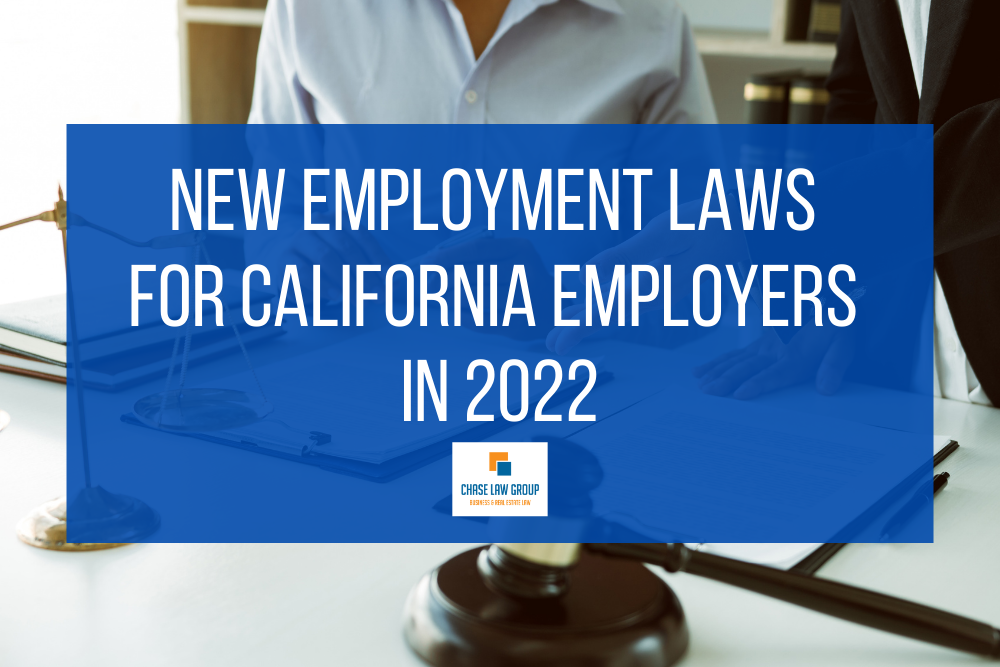New Employment Laws For California Employers in 2022
By Admin December 10, 2021 Category: Business Law

The Governor has signed into law several new pieces of legislation effective January 1, 2022. Here are the changes that impact your business.
Minimum Wage Increase in California
Minimum wage for California workers of Employers with 26 or more employees will increase to $15.00 per hour. For employers with 25 or fewer employees, minimum wage will be $14.00 per hour. Note that for the City of Los Angeles, minimum wage is $15.00 per hour regardless of the employer’s size. (Related Article: Be sure to read about required California and Federal Labor Law Postings and how it includes remote employees under SB 657 effective January 1, 2022.)
Expansion of CFRA Leave For Parent In Laws And New Notification Requirements of Mediation Rights of CFRA Claims
Last year the California Family Rights Act was extended to employers with 5 or more employees and also provided leave for the care of certain family members. The new law also provided leave for the care of family members other than an employee’s immediate family. AB 1033, effective January 1, 2022, confirms that employees can take leave under the California Family Rights Act to care for a parent in law. It also provides that small employers (with 5 to 19 employees) eligible for mediation of a claim under the CFRA will get notice of the right to mediate, as employees must participate in mediation before they file the DFEH claim. It also requires that the DFEH notify the employees of this requirement. It further empowers small employers to stay an action should an employee fail to participate in mediation.
New Cal/OSHA Penalties
SB 606 created two new Cal/OSHA violation categories “enterprise wide” and “egregious”. The new law creates a rebuttable presumption that a violation has been committed by an employer with multiple worksites is “enterprise wide.” If the employer has a policy or procedure that violates safety rules or evidences a pattern or practice of violating the safety concerns, Cal/OSHA can issue an enterprise wide citation that will result in penalties. Similarly, if Cal/OSHA can cite an employer for an “egregious” violation if it believes an employer has willfully and egregiously violated an order based upon several criteria including intentional inaction despite being aware of a violation, the employer’s conduct amounts to bad faith, if the employer has an extensive history of violations. Speak with an employment attorney regarding any issues of concern.
Added Criminal Penalties for Wage Theft
AB 1003 modifies California’s wage theft laws imposing even greater penalties including criminal penalties. Wage theft occurs when employers do not pay workers according to the law. Examples of wage theft include paying less than minimum wage, not paying workers overtime, not allowing workers to take meal and rest breaks, requiring off-the-clock work, or taking workers’ tips. AB1003 establishes that intentional theft of wages, benefits or compensation in the amount of $950 for one employee or more than $2,350 for two or more employees in a consecutive 12 month period is punishable as grand theft under the California Penal Code which may be prosecuted as a misdemeanor or felony. This applies to both employees as well as independent contractors.
Expansion of Prohibition of Non-Disclosure Provisions in Settlement Agreements
SB 331 expands the prohibition of non-disclosure agreements in settlements with employees to include any characteristic defined under the DFEH, and not just those based upon sex. Under the new statute, employees cannot be required to agree not to discuss unlawful acts. However, note that employers can still include language in settlement agreements that prevents disclosure of the amount paid to the employee, just not the underlying facts and claim if unlawful acts are alleged.
Miscellaneous changes regarding classification of workers
A few new laws were passed impacting certain industries including warehouse distribution centers, garment manufacturers, hospitality/building services, agriculture, and janitorial services. If your company falls into any of these industries, contact Chase Law Group for further discussion regarding how these changes apply to your business.

